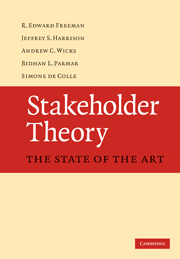Book contents
- Frontmatter
- Contents
- List of figures
- List of tables
- Acknowledgements
- Preface
- Part I The genesis of stakeholder theory
- Part II Stakeholder theory and the traditional disciplines of business
- 4 Stakeholder theory and strategic management
- 5 Stakeholder theory in finance, accounting, management, and marketing
- 6 Stakeholder theory in related disciplines
- Part III Stakeholder theory, ethics, and corporate social responsibility
- Part IV Stakeholder theory: some future possibilities
- Bibliography
- Index
6 - Stakeholder theory in related disciplines
from Part II - Stakeholder theory and the traditional disciplines of business
Published online by Cambridge University Press: 05 June 2012
- Frontmatter
- Contents
- List of figures
- List of tables
- Acknowledgements
- Preface
- Part I The genesis of stakeholder theory
- Part II Stakeholder theory and the traditional disciplines of business
- 4 Stakeholder theory and strategic management
- 5 Stakeholder theory in finance, accounting, management, and marketing
- 6 Stakeholder theory in related disciplines
- Part III Stakeholder theory, ethics, and corporate social responsibility
- Part IV Stakeholder theory: some future possibilities
- Bibliography
- Index
Summary
In this chapter we shall explore the footprint of stakeholder theory in some of the disciplines that are less frequently linked with business, but are nonetheless important to the study of organizations. The specific focus is on the use of stakeholder theory in the law, in public administration, in health care, and in environmental policy. As originally formulated, stakeholder theory is a theory about (business) organizations, so it is not surprising to see that stakeholder theory has had considerable influence on strategy, ethics, and other related disciplines. Other chapters of this book lay out in detail the considerable influence that stakeholder theory has had on research in these areas. What is more surprising, and a testament to the power and salience of stakeholder theory, is to see its influence in a range of other literatures that are partly inside and partly outside the domain of business.
Equally interesting are the ways in which stakeholder theory is interpreted and applied within these literatures. While there are some discussions of the normative dimensions of stakeholder theory, much of this literature focuses on instrumental use of the concept and specific methods for mapping out and engaging stakeholders. As was noted in Chapter 5, most of the work has involved the literatures under review here borrowing concepts from stakeholder theory rather than focusing on contributions to the core stakeholder literature, particularly as it relates to its normative dimensions.
- Type
- Chapter
- Information
- Stakeholder TheoryThe State of the Art, pp. 163 - 192Publisher: Cambridge University PressPrint publication year: 2010



